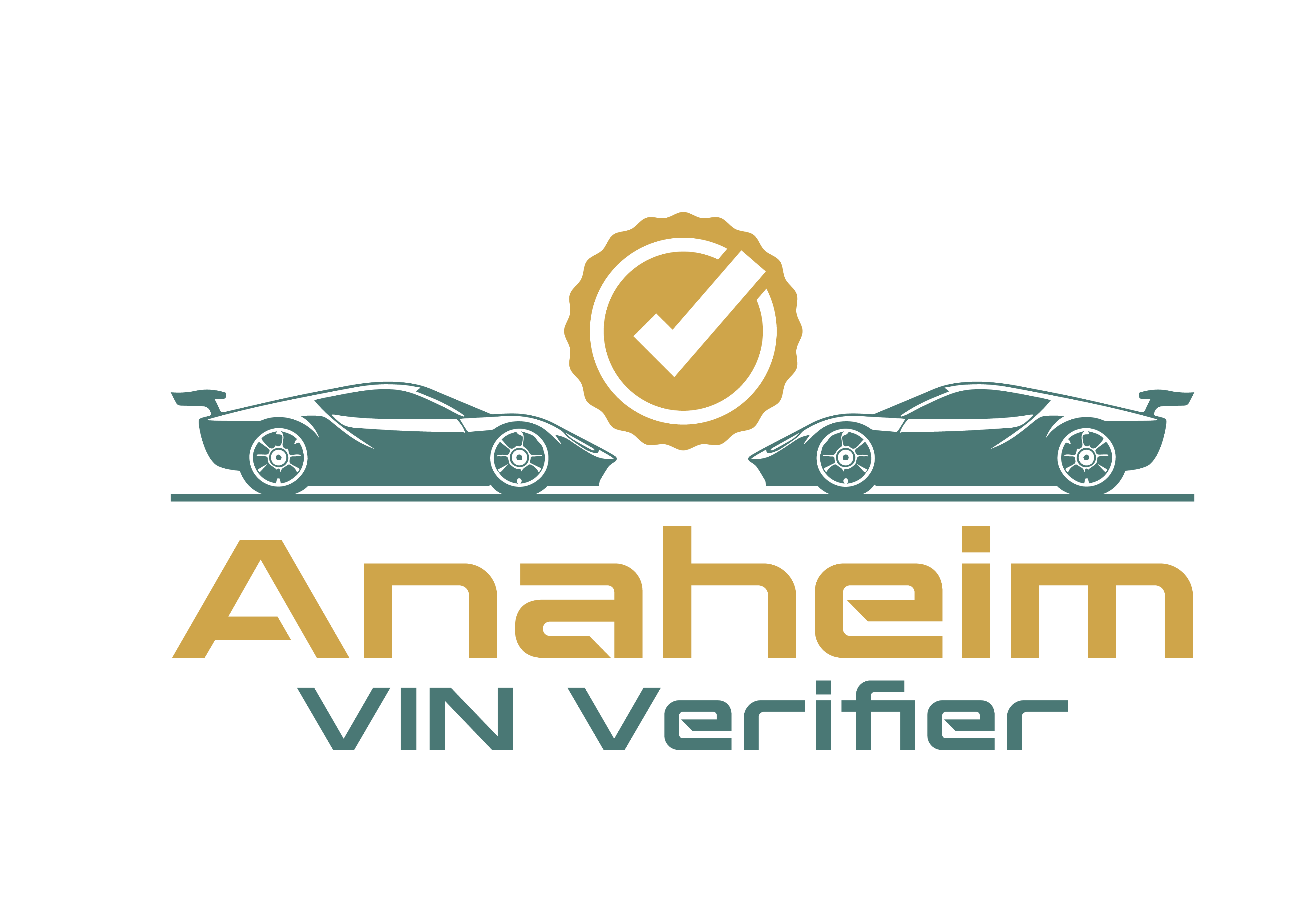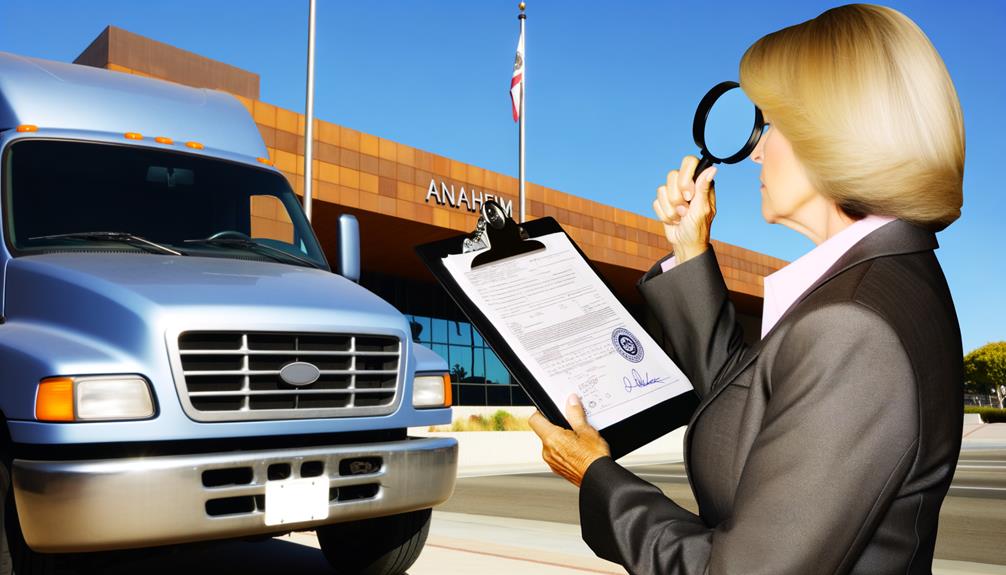If you're in the process of registering your commercial vehicle in California, you might find the Anaheim VIN Verifier to be an invaluable resource. This service simplifies the complex task of VIN verification, which is a critical step to ensure your vehicle complies with state regulations. You'll need to navigate through paperwork and understand specific requirements tailored for commercial vehicles over 10,001 lbs. GVW. Perhaps you're wondering about the nuances of the inspection criteria or the specific forms like REG 31 and REG 343? Unraveling these details can significantly streamline your registration process and potentially save you from legal headaches down the road.
Understanding VIN Verification
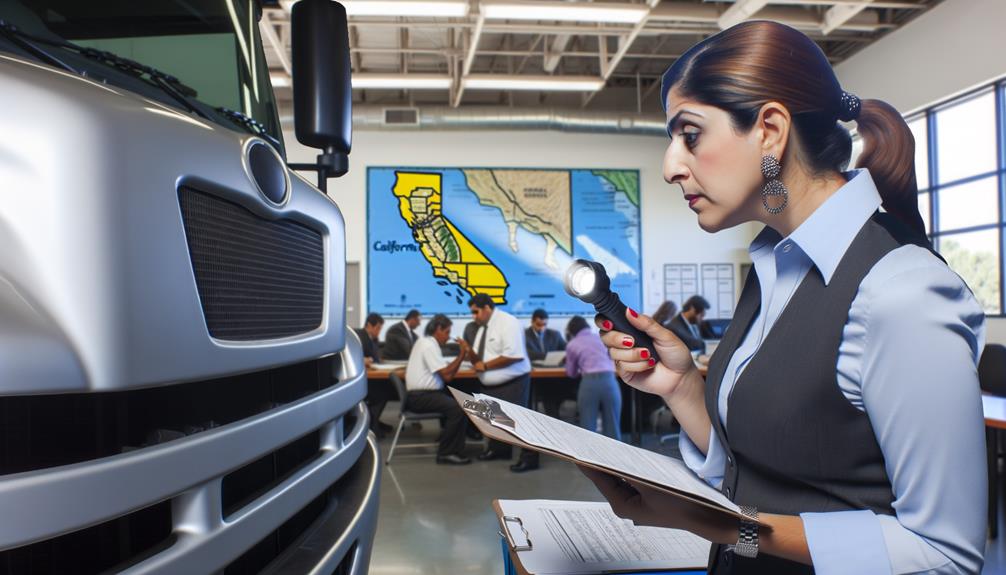
When registering an out-of-state commercial vehicle in California, you must undergo VIN verification to ensure the vehicle's identification number matches official DMV records. This step is crucial; it's about confirming your freedom to operate your vehicle without legal hassles. The process involves a thorough inspection by licensed vehicle verifiers who check that your commercial vehicle's details align perfectly with what's on file at the DMV.
You'll need to complete the REG31 form, which captures the specifics of your vehicle—year, make, model, and where the VIN is located. It's not just about the VIN; the inspection criteria also include verifying the number of wheels and axles, noting the vehicle's fuel type, emissions label, and even the license plate information. This comprehensive check ensures everything is up to par and meets California's strict standards.
In addition to local DMV staff, CHP officers are also authorized to conduct these verifications, though an appointment and referral might be necessary. This is particularly relevant for specific cases like re-registering salvage or junked vehicles where CHP expertise is indispensable.
If driving down to the DMV isn't your thing, consider mobile VIN verification services. They bring the verification to you, offering a convenient alternative that fits into your busy schedule. Whether you choose the DMV, a mobile verifier, or another authorized entity like AAA or CHP, getting this done is your key to a smooth registration process in California
Commercial Vehicle Categories
How do you determine the category of your commercial vehicle in California? It's simpler than you might think. If you're transporting property or people for hire, and your vehicle tips the scales at over 10,001 lbs. in Gross Vehicle Weight (GVW) or Combined Gross Weight (CGW), you'll need to register it as a commercial vehicle. This includes a diverse array of vehicle types—buses, motor trucks, pickups, tow trucks, and truck tractors, each with specific registration requirements under California regulations.
For heavier vehicles, the registration process involves additional steps such as obtaining a motor carrier permit through the MCP Unit Registration, reflecting the increased responsibility and potential road impact of these larger vehicles. But what if your vehicle serves more than one purpose? Multipurpose vehicles offer you the flexibility to register them either as passenger or commercial vehicles, depending on how you use them. This adaptability is crucial, especially when your business needs or vehicle usage might change
Registration Process Steps
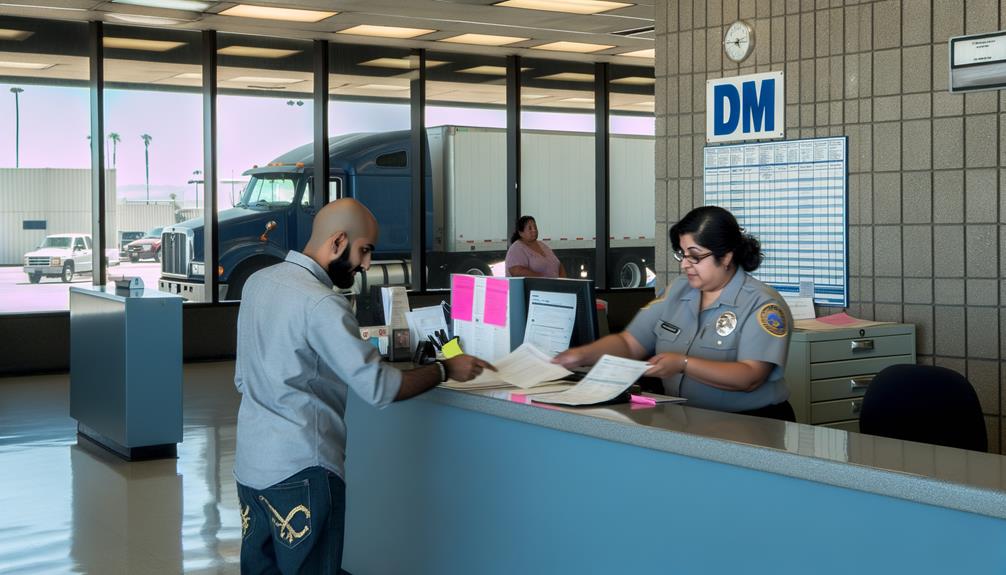
Begin your journey to registering your commercial vehicle in California by completing the Application for Title or Registration (REG 343). This step marks your path to freedom on the roads, ensuring you're all set to navigate through bustling city streets or serene highways. After you've filled out the form, move onto the next critical component: the Verification of Vehicle (REG 31). This isn't just paperwork; it's your ticket to confirming your vehicle's identity and securing your peace of mind.
Next, assess and pay the registration fees, which vary based on your vehicle's weight classification. If you've modified your vehicle and this affects its classification, remember to report these changes. It's not just about staying compliant; it's about ensuring you're paying the right fees and avoiding any surprises later on.
Lastly, if your commercial vehicle is a diesel and tips the scales over 14,000 lbs., keep in regular touch with the California Air Resources Board (CARB) regulations. Staying updated isn't merely about compliance—it's about maintaining the liberty to operate your business without interruptions. Welcome to a smoother registration process with the California DMV!
Compliance and Regulations
Navigating the regulations for commercial vehicle registration in California requires understanding several key compliance factors. You've got to get through some red tape to keep your freedom on the roads with your commercial vehicles. First off, ensure your vehicle undergoes VIN verification, a crucial step managed by a qualified VIN verifier. This isn't just a formality—it's a safeguard to make sure your vehicle meets all legal standards.
Now, if your vehicle tips the scales over 10,001 lbs., either as GVW or CGW, you're diving into deeper waters with the California DMV. You must complete the Application for Title or Registration (REG 343) and declare your vehicle's weight on the Declaration of Gross Vehicle Weight (REG 4008). Don't overlook this; it's not just about weight but compliance with the California Vehicle Registration Act (CVRA), which swaps traditional fees for specific ones and requires CVRA weight decals.
For those operating diesel vehicles over 14,000 lbs., CARB regulations come into play. Compliance here isn't optional—it's enforced based on your vehicle's model year and phased implementation. Non-compliance isn't just a slap on the wrist; it can stop you from registering or transferring your vehicle. So, stick to the rules to avoid penalties and keep your business moving smoothly.
Registration Fees Overview

Understanding the registration fees for your commercial vehicle in California is crucial as they vary depending on several factors. These costs are primarily calculated based on your vehicle's unladen weight or declared Gross Vehicle Weight (GVW) or Combined Gross Weight (CGW). Particularly, if your vehicle exceeds 10,001 lbs. GVW, you'll face specific fees tailored to heavier weight classifications.
You should be aware that additional fees kick in with increased weight classifications at the time of registration. It's important to get this right the first time around, as there are no refunds for modifications that lead to a lower classification after you've registered. Staying informed and choosing wisely can save you from unnecessary expenses.
Participating in the Permanent Trailer Identification (PTI) program involves a service fee for the original registration and subsequent renewals every five years. Don't worry about missing a renewal date; you'll get a notice 60 days before your registration expires. Also, under the new California Vehicle Registration Act (CVRA), you'll receive new stickers only for weight changes or if your current stickers are damaged. For those enrolled in the Permanent Fleet Registration (PFR) program, expect monthly renewal listings to keep everything up-to-date.
Inspection Criteria
When registering your commercial vehicle in California, you'll first need to meet specific inspection criteria. These criteria are essential not just for compliance but to ensure you maintain your freedom on the road without legal hitches. The VIN verification process involves a thorough check by licensed vehicle verifiers who document your vehicle's year, make, model, and critical VIN location. They'll also verify the number of wheels and axles to match it with the California Department of Motor Vehicles standards.
Moreover, your vehicle's license plate, fuel type, emissions label, and odometer reading are recorded to verify the vehicle's current state and ensure it meets environmental and safety registration requirements. It's crucial to remember that vehicles lacking a Federal Safety label from 1980 onwards cannot be verified. Similarly, revived salvage or junked vehicles, as well as motorcycles not previously registered in the DMV database or lacking proper documentation, fall outside the verifier's capability.
Service Locations and Costs
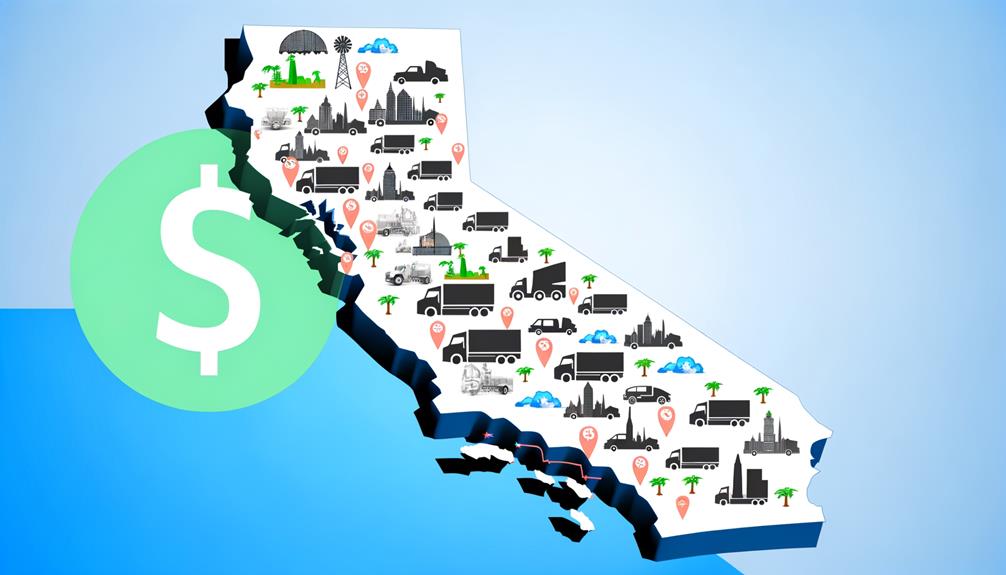
After ensuring your commercial vehicle meets the necessary inspection criteria, the next step involves selecting a service location and understanding the associated costs for VIN verification. You've got several options to streamline your registration process. Quick VIN Verifications offers in-office services for $75 or mobile services for $125 within Orange County, ensuring convenience if you're always on the move. They extend their reach, providing services in multiple counties including Riverside, San Bernardino, San Diego, and Eastern LA, enhancing accessibility wherever you are.
Alternatively, AAA members enjoy free VIN verification services, while non-members will need to look elsewhere. Don't worry if you're not a member; the DMV and CHP also conduct VIN verifications at no cost. Remember, they don't offer the flexibility of mobile services, so you'll need to visit them directly, making sure your paperwork is prepared in advance to avoid any hiccups.
Regarding payment, Quick VIN Verifications accepts a variety of methods including cash, checks, Zelle, Venmo, and credit/debit cards, catering to your preferred way of handling finances. This flexibility ensures that the process is as hassle-free as possible, letting you focus on what you do best.
